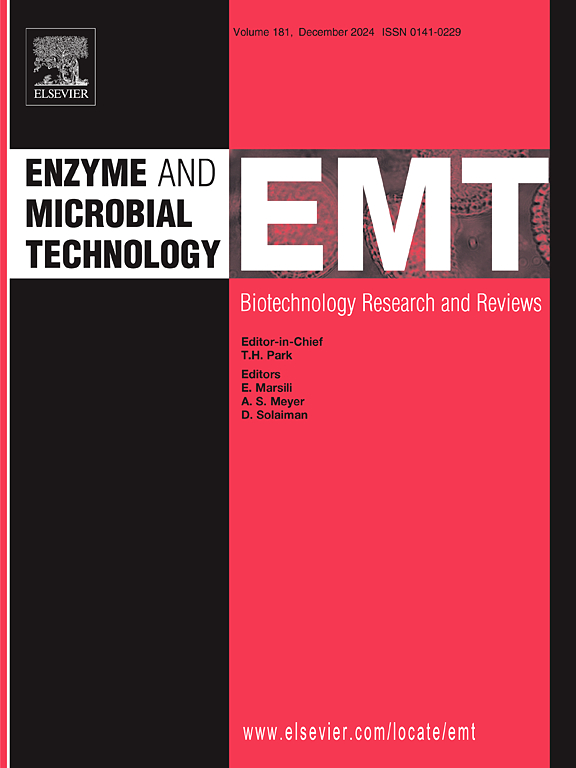Influence of a rumen ciliate-derived xylanase on the gut microbiota composition: A potential enzyme for prebiotic applications
IF 3.7
3区 生物学
Q2 BIOTECHNOLOGY & APPLIED MICROBIOLOGY
引用次数: 0
Abstract
A xylanase derived from rumen ciliates designated as XynC, was successfully expressed and purified. The enzyme's catalytic properties, including its optimal pH (5.5) and temperature (40 °C), were determined, demonstrating high stability under mildly acidic and moderate thermal conditions. The substrate specificity of XynC was investigated by analyzing its hydrolysis pattern with beechwood xylan, where it preferentially degraded higher xylo-oligosaccharides (xylotetrose (X4), xylopentose (X5), xylohexose (X6)) while showing no activity on smaller oligosaccharides like xylobiose (X2) and xylotriose (X3). The in vivo effects of XynC on gut microbiota were evaluated by administering the enzyme to mice, followed by analysis of fecal 16S rRNA to assess shifts in gut bacterial populations. The results revealed dose-dependent modulation of gut microbiota composition, with a significant increase in Lactobacillus abundance observed in the medium- and high-dose groups, while no notable change was detected in the low-dose group. These dose-related microbial responses suggest that the efficacy of XynC in promoting probiotic growth is dependent on administration level. These findings suggest that XynC selectively promotes the growth of beneficial probiotics in a dosage-sensitive manner, supporting its potential as a functional feed additive for enhancing gut health and nutrient utilization in livestock.
瘤胃纤毛虫衍生的木聚糖酶对肠道菌群组成的影响:一种潜在的益生元应用酶
从瘤胃纤毛中成功表达并纯化了一种木聚糖酶,命名为XynC。测定了该酶的催化性能,包括其最佳pH值(5.5)和温度(40°C),在轻度酸性和中等热条件下表现出高稳定性。通过分析XynC与山毛榉木聚糖的水解模式,研究了其底物特异性,其中XynC优先降解高级低聚木糖(xylotetrose (X4)、xylopentose (X5)、xylohexose (X6)),而对低聚木糖(xylobeose (X2)和xylotriose (X3))没有活性。通过给小鼠注射XynC酶,然后分析粪便16S rRNA来评估肠道细菌群的变化,从而评估XynC对肠道微生物群的体内影响。结果显示了肠道微生物群组成的剂量依赖性调节,在中剂量组和高剂量组中观察到乳酸杆菌丰度显著增加,而在低剂量组中没有发现显着变化。这些剂量相关的微生物反应表明,XynC促进益生菌生长的功效取决于给药水平。这些结果表明,XynC以剂量敏感的方式选择性地促进有益益生菌的生长,支持其作为增强牲畜肠道健康和营养物质利用的功能性饲料添加剂的潜力。
本文章由计算机程序翻译,如有差异,请以英文原文为准。
求助全文
约1分钟内获得全文
求助全文
来源期刊

Enzyme and Microbial Technology
生物-生物工程与应用微生物
CiteScore
7.60
自引率
5.90%
发文量
142
审稿时长
38 days
期刊介绍:
Enzyme and Microbial Technology is an international, peer-reviewed journal publishing original research and reviews, of biotechnological significance and novelty, on basic and applied aspects of the science and technology of processes involving the use of enzymes, micro-organisms, animal cells and plant cells.
We especially encourage submissions on:
Biocatalysis and the use of Directed Evolution in Synthetic Biology and Biotechnology
Biotechnological Production of New Bioactive Molecules, Biomaterials, Biopharmaceuticals, and Biofuels
New Imaging Techniques and Biosensors, especially as applicable to Healthcare and Systems Biology
New Biotechnological Approaches in Genomics, Proteomics and Metabolomics
Metabolic Engineering, Biomolecular Engineering and Nanobiotechnology
Manuscripts which report isolation, purification, immobilization or utilization of organisms or enzymes which are already well-described in the literature are not suitable for publication in EMT, unless their primary purpose is to report significant new findings or approaches which are of broad biotechnological importance. Similarly, manuscripts which report optimization studies on well-established processes are inappropriate. EMT does not accept papers dealing with mathematical modeling unless they report significant, new experimental data.
 求助内容:
求助内容: 应助结果提醒方式:
应助结果提醒方式:


